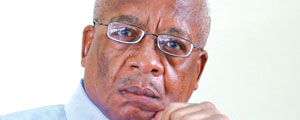
The first and last time I saw Nelson Mandela was at Harare’s Town House in March 1990 just before the ceremony to confer him Freedom of the City.
Echoes by Conway Tutani
I found his great size, stately appearance and dignity of bearing highly impressive. He was presidential even four years before he became President, but so down-to-earth and amiable was he.
Mandela appeared avuncular; like you find in your favourite maternal uncle/malume/sekuru. Uncles are known for their jolliness, kindness and indulgence with their nephews and nieces. This was my close-range view of Mandela. He was not an actor; he was real. What you saw is what you got. He made all feel at ease. He totally changed my perception of leadership.
I am glad to say I am not the only one who was struck by the magic of Madiba, as Mandela became affectionately and universally known by his Xhosa clan name. He touched everyone he came across to the point that they felt like they knew him personally.
From the East to the West; from the North to the South, the biggest gathering of world leaders was in South Africa this week for the one and only Mandela. Former British Prime Minister Tony Blair said Mandela “made racism not just immoral, but stupid”. Yes, Mandela, who died last week at the ripe old age of 95, peeled racism layer by layer until there was nothing to justify it.
This world is full of obstacles, but how many people have faced as many obstacles as Mandela and overcome them? Twenty-seven years in jail for the “crime” of fighting racism, a painful divorce from the love of his life Winnie shortly after his release and a divided family? Madiba travelled from prison to President, remarried and found marital bliss in Graca Machel, and was working hard to bring the family together, acknowledging that he too had made mistakes, until health failed him. Mandela could not be faulted for moral clarity.
The long, interminable hours of solitary confinement in his Robben Island prison cell made him highly contemplative. He did not take things for granted, but thought through every situation. His thought process could not be faulted.
- Chamisa under fire over US$120K donation
- Mavhunga puts DeMbare into Chibuku quarterfinals
- Pension funds bet on Cabora Bassa oilfields
- Councils defy govt fire tender directive
Keep Reading
But he was not a soft touch. He was kind, but firm. F W de Klerk, apartheid South Africa’s last white President, found out that Mandela was not pliant just because he had been released from what turned out to be 27 years’ imprisonment of a life sentence. Mandela didn’t let their new-found friendship get in the way of the job at hand and plainly told De Klerk to stop stalling the inevitable process to democracy or ship out. He knew the regime had not released him out of kindness, but because of his political leverage.
That world leaders of all political persuasions came to bid him farewell showed he was not anyone’s puppet. He had a fiercely independent streak. That’s why he was the least ideological of politicians.
“What I am condemning is that one power, with a President who has no foresight, who cannot think properly, is now wanting to plunge the world into a holocaust.” Who said this? Madiba in 2003 when the United States, under President George W Bush, was about to invade Iraq. And that wasn’t all. He also condemned Blair for his strong support of the US invasion.
And some things go without saying. Mandela as President, was the Commander-in-Chief (C-in-C) of the South African National Defence Force. So is Barack Obama C-in-C of the US Armed Forces. But South Africans and Americans are not reminded daily of that because it’s neither unique nor necessary.
The lying brigade has been ranting and raving that Mandela perpetuated white rule by protecting white interests. The criticism is completely baseless.
Madiba served for only one term so he couldn’t have compressed all the required changes in that single term. Furthermore, there were “sunset clauses” in the South African Constitution which restricted his span of action — like the clauses in Zimbabwe’s Lancaster House Constitution which guaranteed 20 seats for whites in Parliament and no compulsory acquisition of farms for the first 10 years of independence.
But today, racism in South Africa is being quickly replaced by a class divide where “political capitalists” (as South African academic Professor William Gumede puts it) in or linked to the ruling ANC grab business opportunities.
In contrast, Mandela did not use power as an instrument of repression or self-enrichment.
He was a latecomer into the Presidency and served only one term by choice, but he achieved much more compared to those African leaders who had been in office for decades.
While Madiba travelled the long road to freedom, these dictators and thieves face a long climb into respectability — unless they see the light, like Ugandan President Yoweri Museveni who could not help but admit this week after attending the funeral: “I am going home, I didn’t realise just how the world has changed till I went to South Africa . . . I have travelled a lot in Africa and abroad, I do not want Uganda to be like our neighbours with retired presidents so old they can no longer run a kilometre . . .”
Museveni, who has become increasingly autocratic after ruling since 1986, saw it for himself. The longer the rule, the more the tendency to oppress because you begin to see it as your birthright to be in office.
If fellow African leaders were half or even a tenth as sincere and well-meaning as Mandela, the continent would be a vastly different place — it’s not asking too much.
After all, there is life after office.











